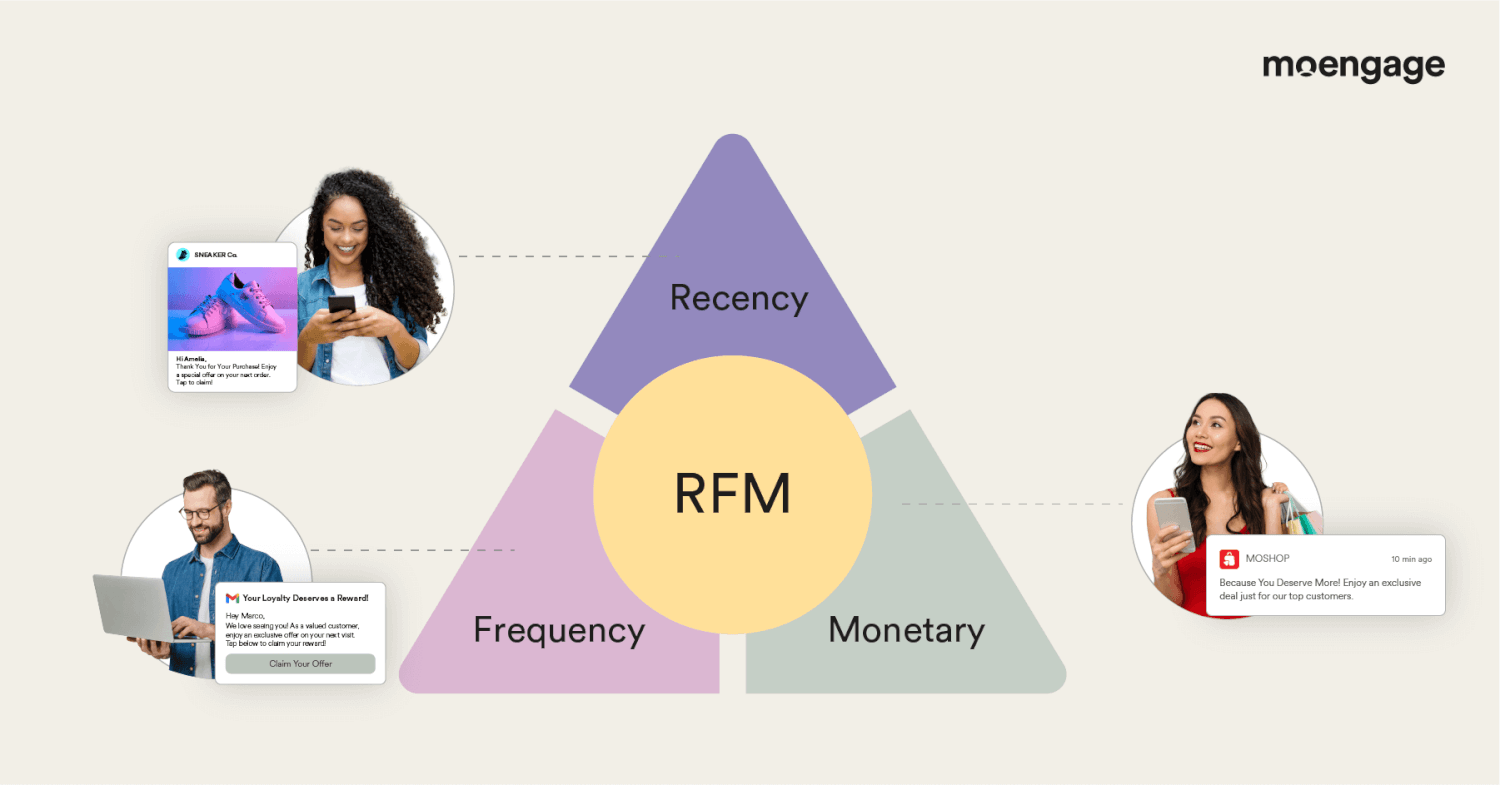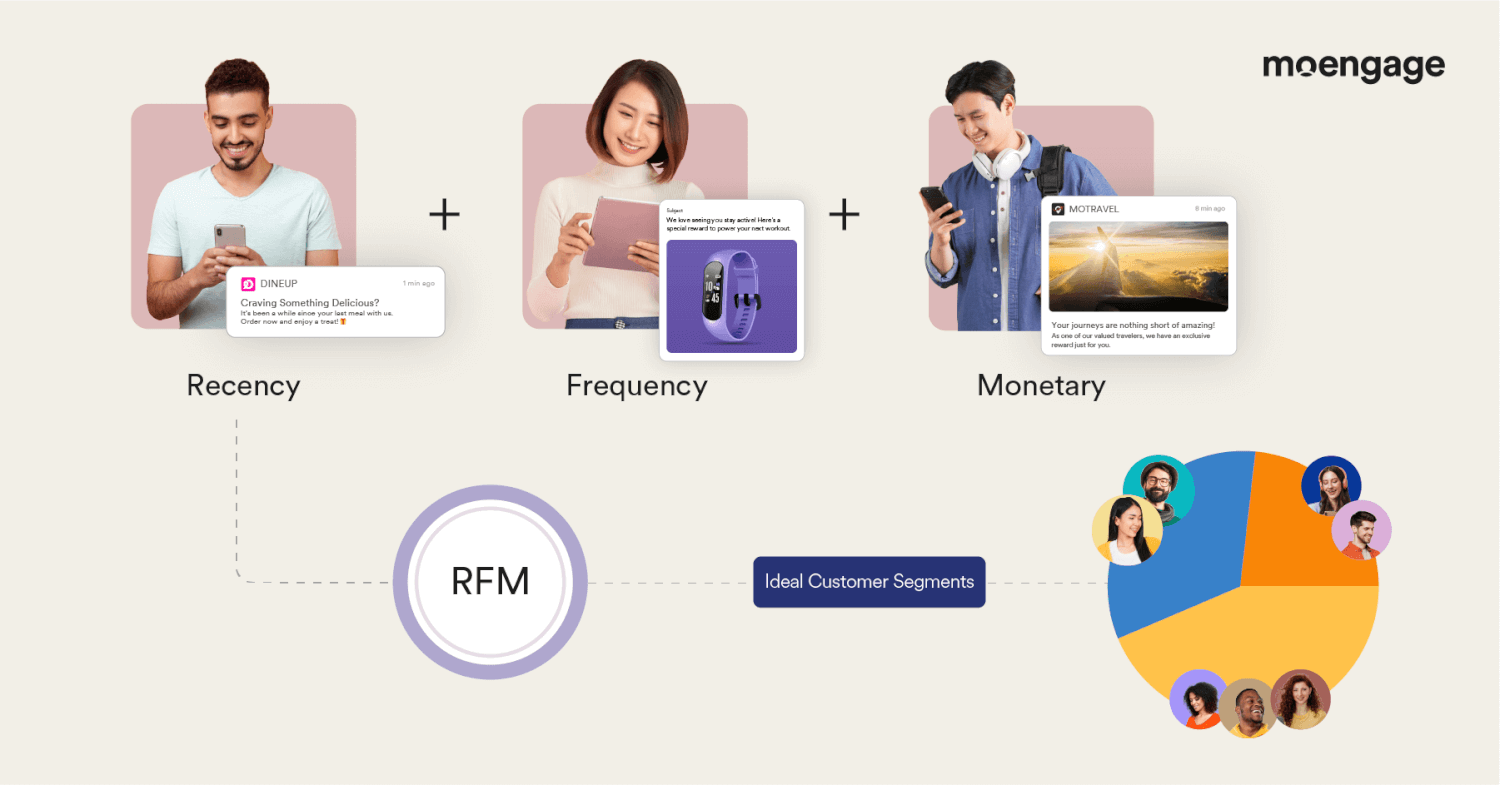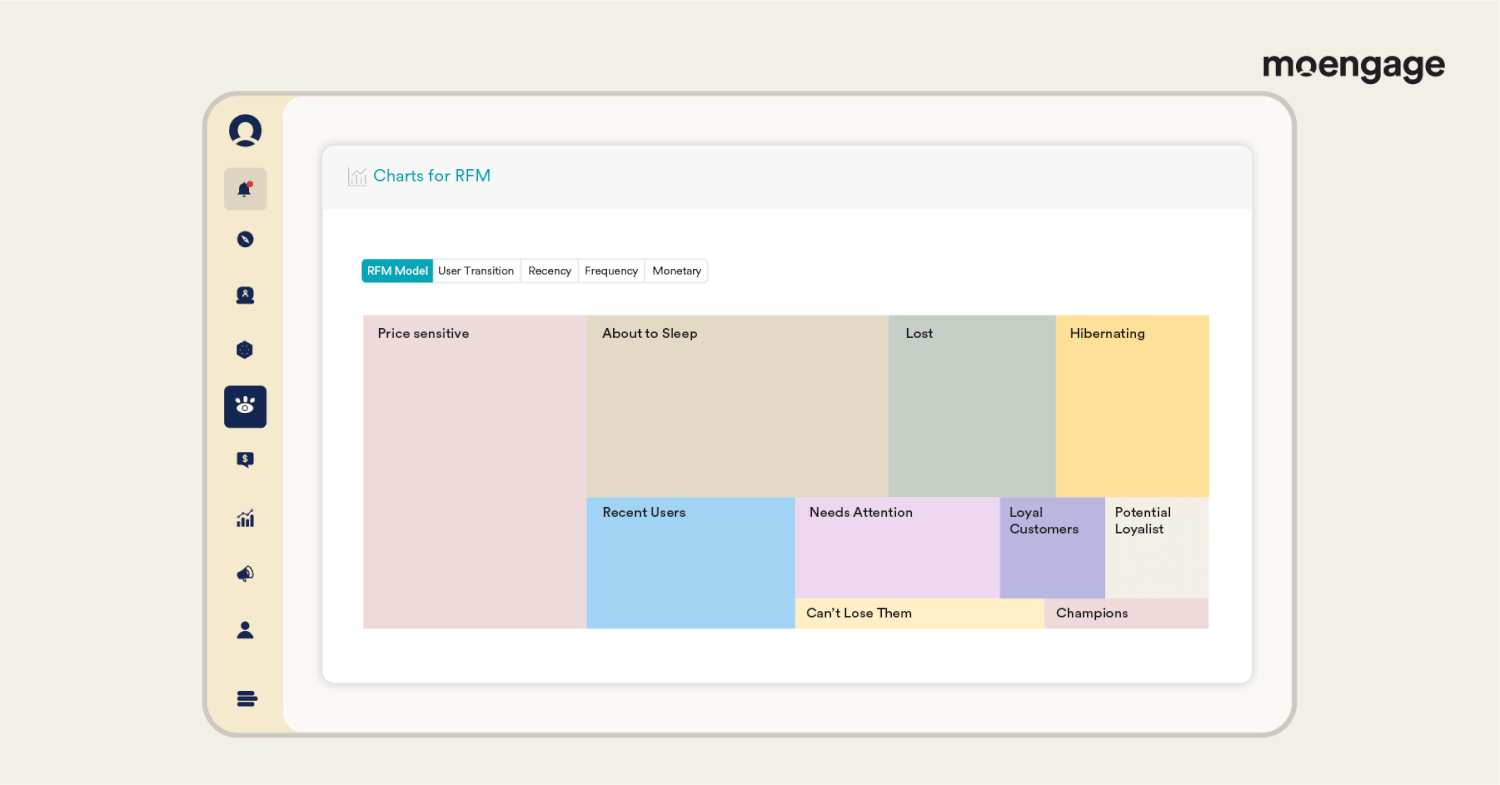Studying Time: 10 minutes
Have you ever ever felt such as you’re throwing advertising and marketing darts at nighttime?
We’ve all been there: campaigns that look excellent, have a smooth design, compelling copy, and a reduction that appears irresistible. You’re feeling tremendous assured. However the outcomes? Disappointingly flat.
The issue isn’t creativity. It’s the method.
We have to perceive that not each buyer is similar. Your most loyal buyer doesn’t want a large low cost to buy. However that buyer who hasn’t engaged in months requires a totally totally different technique.
This implies you have to create totally different sub-campaigns focused at particular viewers segments.
That’s the place RFM is available in— consider it as your advertising and marketing GPS.
What Is RFM Evaluation?
RFM evaluation is a buyer segmentation method that evaluates three key metrics: Recency (how lately a buyer made a purchase order), Frequency (how usually they purchase), and Financial worth (how a lot they spend). The method dates again to 1970.
What Are the Three Elements of the RFM Components?
The “RFM” in RFM Evaluation stands for Recency. Frequency. Financial worth. These three variables type the premise for the segmentation.

Utilizing totally different combos of those variables, manufacturers can section prospects. For instance, they’ll decide which prospects store probably the most, which prospects are more likely to churn, and extra to supply them with curated engagement to make sure they’re joyful and advertising and marketing targets are fulfilled.
The fantastic thing about RFM lies in its simplicity—all the mandatory knowledge already exists inside your buyer database, equivalent to when the shopper final visited, final bought, and extra. That is ample for the RFM mannequin to perform and provides outcomes.
When you implement it, RFM evaluation instantly gives you together with your most beneficial buyer segments:
- Prepared-to-Purchase Clients: These most certainly to make their subsequent buy quickly
- At-Threat Clients: These exhibiting indicators they may go away
- Model Champions: Your most loyal, high-spending prospects
- Lengthy-term Clients: Established patrons who present constant worth
This data-driven method helps companies determine high-value prospects, predict buying habits, and develop focused advertising and marketing methods primarily based on precise buyer transaction patterns. RFM segmentation permits entrepreneurs to give attention to these buyer segments with the best potential for conversions.
With these insights, manufacturers can craft customized engagement methods that talk straight to every section’s particular wants and behaviors—remodeling generic advertising and marketing into precision-targeted buyer experiences.
Find out how to Do RFM Evaluation?
RFM evaluation assigns scores to prospects primarily based on three key variables, serving to companies section their viewers successfully. Let’s see how this works in observe with actual examples.
Companies usually assign scores from 1-5 for every variable (Recency, Frequency, Financial worth). Increased buyer exercise earns larger scores. These scores can then be mixed to create an general RFM rating that guides buyer segmentation and focused advertising and marketing efforts.

Let’s perceive this higher with examples for every variable –
1. What Is Recency within the RFM Mannequin?
Recency measures how lately a buyer made a purchase order. Clients who’ve engaged together with your model in the previous couple of weeks usually have stronger model recall and the next chance of buying once more.
Scoring Instance:
- Buyer A bought yesterday – Rating: 5
- Buyer B bought 30 days in the past – Rating: 3
What constitutes “good” recency varies considerably by business and product lifecycle. A grocery app would view recency in another way than a luxurious furnishings retailer.
2. What Is Frequency within the RFM Mannequin?
Frequency tracks how usually prospects purchase inside your timeframe. Increased frequency usually signifies stronger loyalty and engagement.
Scoring Instance:
- Buyer A made 8 purchases final month – Rating: 5
- Buyer B made 3 purchases final month – Rating: 3
Frequency benchmarks ought to align with what you are promoting mannequin and typical buy cycles.
3. What Is Financial Worth within the RFM Mannequin?
The Financial worth measures buyer spending and sometimes carries probably the most weight within the evaluation. Some prospects buy steadily with low worth, whereas others make rare however high-value purchases.
Scoring Instance:
- Buyer A spent $1,000 in 2 months – Rating: 2
- Buyer B spent $5,000 in 3 months – Rating: 4
The financial thresholds ought to replicate what you are promoting economics and business requirements.
Find out how to Automate RFM Evaluation Utilizing AI Brokers?In 2025, doing an RFM evaluation is extra simple and faster, due to AI brokers that routinely ingest buyer knowledge. MoEngage AI brokers can calculate Recency, Frequency, and Financial values, assigning dynamic scores primarily based on real-time tendencies. They then create granular buyer segments and, leveraging predictive modeling, generate tailor-made marketing campaign methods for every section and extra. |
Find out how to Calculate RFM Scores
Step one is to create section buckets primarily based on the RFM Evaluation –
Clients exhibiting related habits on R, F, M scores, and RFM combination scores are grouped into the identical RFM buckets or segments. These segments are recognized and named with respect to buyer habits.
Right here’s the four-step framework to create one such section bucket –
Step 1: Acquire and collate related Recency, Frequency, and financial worth
| Buyer | Recency Rating (Worth) | Frequency Rating (Worth) | Financial Rating (Worth) |
| #1 | 1 (10) | 1 (1) | 4 (5500) |
| #2 | 2 (8) | 3 (4) | 1 (800) |
| #3 | 3 (4) | 4 (7) | 2 (2400) |
| #4 | 4 (3) | 5 (11) | 5 (9700) |
| #5 | 5 (1) | 2 (2) | 3 (4300) |
Step 2: Set the RFM scales
| Rating | Recency Scale | Frequency Scale | Financial Scale |
| 1 | Final purchased a 12 months in the past | Purchased yearly | Lower than 1000 |
| 2 | Final purchased 9 months in the past | Purchased thrice a 12 months | 1001 – 3000 |
| 3 | Final purchased 6 months in the past | Purchased 5 occasions a 12 months | 3001 – 5000 |
| 4 | Final purchased 3 months in the past | Purchased 7 occasions a 12 months | 5001 – 7000 |
| 5 | Final purchased 1 month in the past | Purchased 10 occasions a 12 months | 7001 – 10000 |
Step 3: Assign RFM scores
| Buyer | Recency Rating (Worth) | Frequency Rating (Worth) | Financial Rating (Worth) |
| #1 | 1 (10) | 1 (1) | 4 (5500) |
| #2 | 2 (8) | 3 (4) | 1 (800) |
| #3 | 3 (4) | 4 (7) | 2 (2400) |
| #4 | 4 (3) | 5 (11) | 5 (9700) |
| #5 | 5 (1) | 2 (2) | 3 (4300) |
Step 4: Label segments
Outline clear, descriptive names for every section that replicate the shopper habits patterns noticed within the RFM evaluation.
By combining these scores, entrepreneurs can determine their most beneficial buyer segments and tailor engagement methods accordingly – from win-back campaigns for lapsed high-value prospects to loyalty rewards for frequent customers.
Find out how to Create RFM Segments Utilizing AI BrokersMoEngage’s AI Brokers streamline segmentation, immediately producing totally different buyer segments with a single click on. Furthermore, these AI brokers transcend segmentation, proactively suggesting tailor-made marketing campaign methods for every section, empowering entrepreneurs with actionable insights and accelerated execution. |
| Label | Traits |
|
These are your dream prospects. They’ve bought lately, store usually, and make substantial purchases. In addition they create constructive WOM (phrase of mouth) for the model amongst their circles. General, they supply a good portion of the enterprise’s income and should be handled with distinctive consideration.
|
|
Excessive-spending prospects with the potential to turn out to be loyal and contribute considerably to enterprise income. |
|
New prospects that’ve lately began utilizing the model and require nurturing to develop long-term model loyalty. This necessary section wants constant monitoring to forestall buyer churn after a couple of preliminary purchases. |
|
Clients who’ve lately began utilizing the model that want nurturing to develop long-term model loyalty and stop buyer churn after a couple of preliminary purchases. This buyer section requires constant monitoring. |
|
This section consists of customers who might cease utilizing the model for numerous causes. To stop this, it’s important to look at their habits and personalize communication additional to extend model belief and loyalty. |
|
This buyer section is important for any enterprise’s success. These prospects have a transparent and constructive notion of the model. They’re glad with the product and repair and are unlikely to change to rivals. It’s essential to make these prospects really feel valued. |
|
Worth is the first issue influencing the buying selections of those prospects, who’re all the time looking for price-led promotions. Their loyalty is just not depending on model interactions however reasonably on worth fluctuations. This section will be simply engaged by gives and reductions. |
|
Hibernating prospects who haven’t engaged with the enterprise in a very long time are liable to being misplaced. The enterprise must make a remaining effort to retain these prospects by growing probably the most related and focused messaging potential. |
|
Present prospects who haven’t made a current buy should be inspired to purchase once more quickly. In any other case, the model dangers shedding the belief and relevance it has constructed with these prospects. |
|
The model’s present prospects who haven’t bought lately should be inspired to purchase once more quickly. If not, the model dangers shedding the belief and relevance it has constructed with these prospects. |
How MoEngage’s RFM Segments Assist With Buyer Segmentation
In MoEngage, every parameter is assigned a price, which ranks prospects primarily based on these values. For instance, a buyer who visited the web site sooner or later in the past (recency), has made 10 purchases over his lifetime engagement with the web site (frequency), and whose final buy is value $1,000 (financial worth) could be assigned values of 5, 4, and 4 on the three parameters, respectively. His general RFM rating could be the common of those values at 4.33.

In comparison with different segmentation strategies, the distinctive factor about this course of is that it’s system-driven. Since there’s no handbook interference, it considerably reduces errors. Clients with related scores are categorized into the identical section to allow entrepreneurs to focus on them precisely.
The totally different segments into which you’ll be able to bucket prospects primarily based on their RFM rating are:
- Champions – These are the newest guests to the web site/app. They’re additionally probably the most frequent and highest-spend prospects.
- Loyal prospects – These prospects have visited lately, visited usually, and made high-value purchases.
- Potential loyalists – These are current prospects who’ve spent an excellent sum of money buying on the web site/app.
Clients falling within the buckets above usually have excessive RFM scores. However that doesn’t imply you may turn out to be complacent with them. It is advisable monitor their scores and transfer them to applicable buckets to make sure that you all the time interact them successfully.
What buyer segments can I create utilizing RFM evaluation?
- Latest customers – These prospects have visited the web site/app lately. However they aren’t frequent guests, nor has their current buy been value some huge cash.
- Promising – These prospects haven’t visited too lately, neither are they among the many most frequent or highest worth customers. They’ve common scores on all parameters.
- Wants consideration – These are prospects who’ve made high-value purchases prior to now. Nonetheless, they haven’t visited the web site/app lately.
- Worth delicate – These customers have visited lately. They’re additionally frequent however don’t spend a lot cash.
- Can’t lose them – These prospects have made high-value purchases prior to now. Nonetheless, they don’t go to the web site/app anymore.
The above classes of consumers are candidates for loyalty campaigns. Analyzing their habits and spending patterns helps to design the proper of campaigns that they are going to reply to.
The final two buckets consist of consumers who’re on the verge of churning out. It’s important to grasp them and win them over earlier than they’re fully past attain –
- About to sleep – These prospects have below-average scores on all three parameters.
- Hibernating – These are prospects who visited the web site/app a very long time in the past and didn’t spend a lot.
You can’t solely bucket prospects into the above segments but additionally view dynamic transitions from one bucket to a different.
RFM Evaluation Instance
Let’s have a look at a few real-life examples of MoEngage RFM Segmentation –
1. Bella Vita Natural
By leveraging MoEngage’s RFM segmentation platform, Bella Vita Natural began re-engaging its dormant prospects by disseminating nudges by the WhatsApp channel. This initiative led to a 12X soar in dormant buyer conversion!
This finally helped them enhance buyer loyalty and retention which led to a 57% uplift within the retention charges! Learn the whole story right here.
2. Anteraja
Anteraja, a logistic service primarily based out of Indonesia, used MoEngage’s RFM segmentation mannequin to section prospects primarily based on their in-app exercise. Utilizing zero code push templates, they had been in a position to creatively interact prospects and enhance engagement charges. Learn the whole case research right here.
3. Speedi
Speedi, a number one E-commerce model primarily based out of Saudi Arabia, utilized the segmentation characteristic of MoEngage to grasp buyer habits and ship them messages by way of push notifications and in-app.
Upon working customized segmentation utilizing RFM, the model witnessed the next conversion charge and click-through charges. One of many marketing campaign instance that the model ran utilizing RFM segmentation was for “LOST USERS”. To reactivate these prospects, Speedi used their push channel to speak curated choices (low cost of 10%) and nudge prospects to finish motion.
Learn the whole story right here.
Advantages of RFM Evaluation
By implementing RFM evaluation, manufacturers can unlock highly effective insights primarily based on precise buyer habits reasonably than assumptions. This data-driven method transforms the way you interact with totally different buyer segments.
Elevated income
RFM evaluation straight impacts your backside line by figuring out high-value prospects and optimization alternatives. By prioritizing engagement together with your most worthwhile segments, you may allocate assets extra successfully and drive vital income progress.
Streamlined messaging
With clear buyer segmentation, you may tailor communications exactly to every group’s habits patterns. This focused method eliminates generic messaging, growing engagement charges and conversion throughout all channels.
Enhanced buyer lifetime worth, buyer retention, and buyer satisfaction
RFM helps prolong buyer relationships by revealing precisely when and how you can interact totally different segments. By understanding every buyer’s place of their lifecycle, you may implement well timed interventions that enhance retention and maximize lifetime worth.
Steps to Calculate RFM Rating
Implementing an efficient RFM technique entails a number of steps. These 4 steps will aid you transition from uncooked buyer knowledge to actionable advertising and marketing campaigns.
1. Create a RFM mannequin
Assign scores (1-5) for Recency, Frequency, and Financial worth to every buyer in your database. This knowledge will be organized in a spreadsheet or buyer engagement platform for evaluation.
2. Construct buyer segments
Divide prospects into distinct teams primarily based on their mixed RFM scores. These segments reveal behavioral patterns that inform your engagement technique.
3. Select section labels
Title your segments primarily based on their RFM traits. Frequent labels embrace Champions (excessive throughout all variables), Loyalists (excessive F and M, reasonable R), At-Threat (low R, excessive earlier F and M), and Dormant (low throughout all variables).
4. Develop focused advertising and marketing campaigns for various buyer teams
Create particular campaigns for every section. For Champions, loyalty applications and unique gives ought to be carried out. For at-risk prospects, re-engagement campaigns with incentives ought to be deployed. For Dormant prospects, take into account win-back campaigns with compelling gives.
Limitations of RFM Evaluation
Whereas RFM gives highly effective segmentation capabilities, it’s necessary to grasp its constraints. Recognizing these limitations helps manufacturers implement RFM as a part of a balanced engagement technique.
Potential for handbook errors
Constructing RFM fashions manually introduces a big danger of calculation errors and misclassification, probably undermining your complete segmentation technique. However you may remedy that by leveraging MoEngage’s AI Brokers.
Buyer engagement imbalance
Over-focusing on high-value segments might create blind spots, inflicting you to neglect growing segments with progress potential and creating engagement bias.
Want for complementary approaches
RFM works greatest as a part of a complete segmentation technique. Mix it with demographic, psychographic, and behavioral knowledge for a extra holistic understanding of your buyer base.
Is RFM Evaluation Nonetheless Related within the Age of AI?
In 2025, AI brokers have revolutionized RFM evaluation, remodeling it from a handbook course of to a totally automated, end-to-end resolution. These AI brokers deal with the intricate knowledge ingestion and scoring and autonomously generate and deploy focused campaigns, considerably decreasing the heavy lifting for advertising and marketing groups. The simplicity and effectiveness of RFM, now enhanced by AI’s predictive capabilities and real-time knowledge integration, guarantee it stays a cornerstone of buyer segmentation, adapting dynamically to evolving client behaviors and market tendencies.
Conclusion
RFM evaluation gives a confirmed framework for remodeling random advertising and marketing efforts into focused, data-driven methods. By segmenting prospects primarily based on their precise buying behaviors, manufacturers can ship customized experiences that resonate with every section’s particular wants. Moreover, they’ll successfully predict future buyer habits.
Whereas not excellent by itself, when mixed with different buyer insights, RFM gives a useful basis for constructing lasting buyer relationships and driving sustainable enterprise progress.

